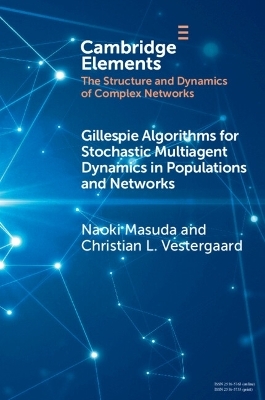
Gillespie Algorithms for Stochastic Multiagent Dynamics in Populations and Networks
Seiten
2023
Cambridge University Press (Verlag)
978-1-009-23914-1 (ISBN)
Cambridge University Press (Verlag)
978-1-009-23914-1 (ISBN)
This Element provides a tutorial on the Gillespie algorithms focusing on social multiagent dynamics and also review their recent extensions. The first main part focuses on simulation of social multiagent dynamics occurring in populations and networks, and the remainder reviews recent extensions of the Gillespie algorithms.
Many multiagent dynamics can be modeled as a stochastic process in which the agents in the system change their state over time in interaction with each other. The Gillespie algorithms are popular algorithms that exactly simulate such stochastic multiagent dynamics when each state change is driven by a discrete event, the dynamics is defined in continuous time, and the stochastic law of event occurrence is governed by independent Poisson processes. The first main part of this volume provides a tutorial on the Gillespie algorithms focusing on simulation of social multiagent dynamics occurring in populations and networks. The authors clarify why one should use the continuous-time models and the Gillespie algorithms in many cases, instead of easier-to-understand discrete-time models. The remainder of the Element reviews recent extensions of the Gillespie algorithms aiming to add more reality to the model (i.e., non-Poissonian cases) or to speed up the simulations. This title is also available as open access on Cambridge Core.
Many multiagent dynamics can be modeled as a stochastic process in which the agents in the system change their state over time in interaction with each other. The Gillespie algorithms are popular algorithms that exactly simulate such stochastic multiagent dynamics when each state change is driven by a discrete event, the dynamics is defined in continuous time, and the stochastic law of event occurrence is governed by independent Poisson processes. The first main part of this volume provides a tutorial on the Gillespie algorithms focusing on simulation of social multiagent dynamics occurring in populations and networks. The authors clarify why one should use the continuous-time models and the Gillespie algorithms in many cases, instead of easier-to-understand discrete-time models. The remainder of the Element reviews recent extensions of the Gillespie algorithms aiming to add more reality to the model (i.e., non-Poissonian cases) or to speed up the simulations. This title is also available as open access on Cambridge Core.
1. Introduction; 2. Preliminaries; 3. Classic Gillespie Algorithms; 4. Computational Complexity and Efficient Implementations; 5. Gillespie Algorithms for Temporal Networks and Non-Poissonian Jump Processes; 6. Conclusions; References.
| Erscheinungsdatum | 19.12.2022 |
|---|---|
| Reihe/Serie | Elements in the Structure and Dynamics of Complex Networks |
| Zusatzinfo | Worked examples or Exercises |
| Verlagsort | Cambridge |
| Sprache | englisch |
| Maße | 151 x 228 mm |
| Gewicht | 170 g |
| Themenwelt | Mathematik / Informatik ► Informatik ► Theorie / Studium |
| Mathematik / Informatik ► Mathematik ► Angewandte Mathematik | |
| Naturwissenschaften ► Physik / Astronomie ► Thermodynamik | |
| ISBN-10 | 1-009-23914-7 / 1009239147 |
| ISBN-13 | 978-1-009-23914-1 / 9781009239141 |
| Zustand | Neuware |
| Haben Sie eine Frage zum Produkt? |
Mehr entdecken
aus dem Bereich
aus dem Bereich
was jeder über Informatik wissen sollte
Buch | Softcover (2024)
Springer Vieweg (Verlag)
37,99 €
Grundlagen – Anwendungen – Perspektiven
Buch | Softcover (2022)
Springer Vieweg (Verlag)
34,99 €
Eine Einführung in die Systemtheorie
Buch | Softcover (2022)
UTB (Verlag)
25,00 €


